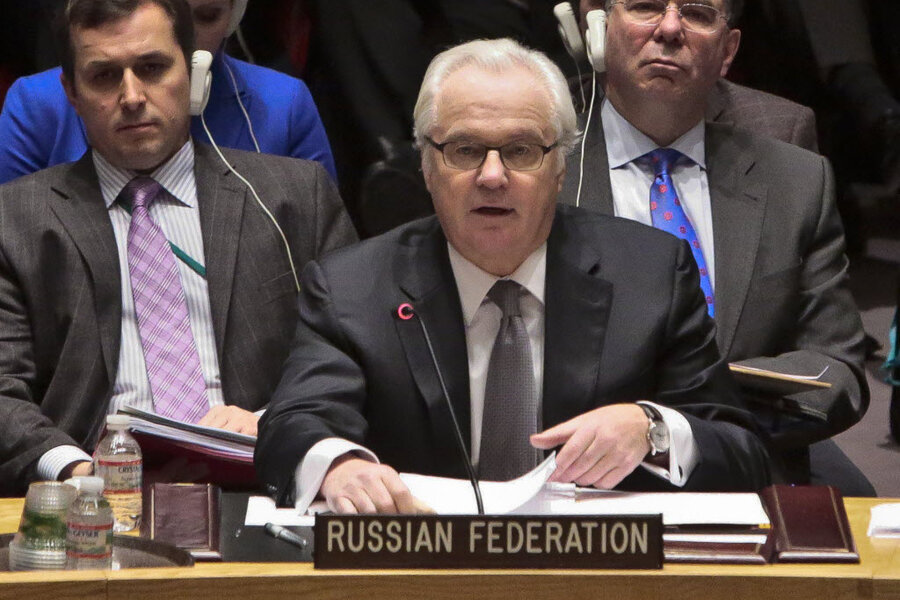Russia claims ousted Ukrainian president requested troops in Crimea
Loading...
| United Nations
Ukraine's fugitive president requested Russian soldiers in the strategic Crimea region "to establish legitimacy, peace, law and order," Russia's U.N. ambassador said Monday, contradicting the president's own comments last week, while Ukraine's ambassador said 16,000 troops are now deployed there.
The disclosure of ousted President Viktor Yanukovych's support for Russian military intervention was made at the third emergency meeting of the U.N. Security Council since Friday. It came amid fears that the Kremlin might carry out more land grabs in pro-Russian eastern Ukraine.
Russia faced demands from almost all council members to pull its troops out of Crimea and got no support for its military action from close ally China.
"With the exception of one member of the Security Council — the Russian Federation — we have heard overwhelming support for the territorial integrity of Ukraine, and for peaceful dialogue," U.S. Ambassador Samantha Power said.
Action by the U.N.'s most powerful body appears unlikely, though Britain's U.N. Ambassador Mark Lyall Grant said, "We certainly do not rule out presenting resolutions in the Security Council in the next few days." Russia has veto power as a permanent member and can block the council from adopting any resolution criticizing or sanctioning Moscow.
During the heated meeting, Russian Ambassador Vitaly Churkin strongly defended his government's actions as "fully appropriate and legitimate" to defend the human rights of the Russian-speaking minority in Ukraine, which he claimed is under threat of oppression from the north and west after violent protests swept in a new government.
He told the council he was authorized to read a statement from Yanukovych — and offered to show council members a copy — requesting Russian President Vladimir Putin to use his armed forces to restore peace and defend the people of Ukraine.
Yanukovych fled the former Soviet republic to Russia after his ouster and had said Friday that he would not ask for Russian forces.
Churkin quoted Yanukovych as saying "Ukraine is on the brink of civil war," people particularly in the Russian-speaking Crimea are being persecuted for language and political reasons and "there are open acts of terror and violence" under the influence of Western countries.
French Ambassador Gerard Araud said the letter was just a piece of paper handed to Yanukovych which "got his signature." Asked if the letter was phony, Araud replied, "It's not a false letter, it's a false president."
Power, the U.S. envoy, dismissed Moscow's contention that it intervened militarily in Crimea to protect the human rights of Russian civilians there as "baseless," insisting there is no evidence of any threats against ethnic Russians in Ukraine.
"One might think that Moscow has just become the rapid response arm of the High Commissioner for Human Rights," she told the council.
Ukraine's U.N. Ambassador Yuriy Sergeyev again pleaded for help and sent a letter to all 193 U.N. member states detailing Russia's takeover of crucial government and military facilities.
The letter described what could be the first reported casualty of the crisis. Sergeyev claimed that Russian forces trying to capture the armory of the Ukrainian Air Tactical brigade near Sevastopol used stun grenades against Ukrainian soldiers Sunday, leaving an officer with a brain injury and in shock.
The letter also said Russian aircraft illegally entered Ukrainian airspace twice Monday night. It said all main roads in Crimea are blocked, military bases and Ukrainian ships in Sevastopol Bay are surrounded and an attempt has been made to capture the Ukrainian Navy Headquarters.
Power said the Organization for Security and Cooperation in Europe — which includes Russia, the U.S., and all European countries — was deploying monitors to Ukraine on Monday night. She urged Russia to allow the monitors to go to Crimea, an appeal echoed by many other council members.
Churkin didn't rule that out but said it must be considered by the government in Crimea.
The Russian ambassador claimed the recent protests were hijacked by extremists and gangs of "ultranationalists," and he said Ukraine should return to an agreement signed Feb. 21 by Yanukovych — but not Moscow — to hold early elections and surrender some powers. Yanukovych fled after sealing the pact with the opposition and foreign ministers of France, Germany and Poland.
Every Security Council speaker but Russia urged a peaceful solution to the worst crisis in Europe in the 21st century. Even China's Ambassador Liu Jieyi didn't endorse Russia's military action, saying: "China consistently stands for the principles of non-interference in the internal affairs of a country, and for respect for Ukraine's independence, sovereignty and territorial integrity."
The meeting featured several rounds of testy exchanges.
"This meeting was unfortunately totally useless," France's Araud said afterward. "We were hoping that the ambassador of the Russian Federation would tell us that the Russian Federation is agreeing to mediation, but they did not. They said that the government of Kiev has no legitimacy."







